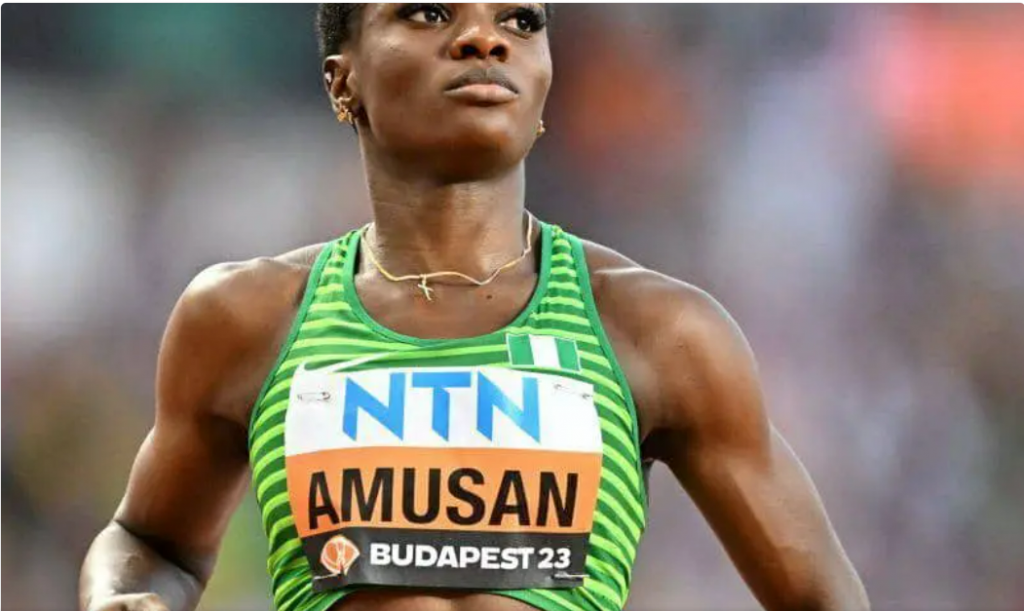Nigeria’s lacklustre performance at the recently concluded 2023 World Athletics Championships in Hungary, Budapest, paints a vivid picture of the current state of athletics and to a large extent sports in the nation. The Budapest outing also stands as an indictment on the leadership of the Athletics Federation of Nigeria (AFN), according to Olympic silver medalist Chidi Imoh.
In an exclusive interview with Sportsville, the acclaimed TV sports show by Sportsville Communications aired on Channels TV, Imoh shared his views on Nigeria’s showing at the championships.
Nigeria’s team of 23 athletes failed to secure any podium positions, with only Tobi Amusan and Ese Brume making it to the finals of their events. These two athletes had won Nigeria’s only medals in the previous edition in Eugene, USA.
Imoh attributes Nigeria’s regression at this year’s World Championships to inadequate preparation and a federation that was not forward-thinking. He expressed his disappointment with the country’s performance and compared it to the achievements of other African nations in the same event.
“It’s just our zeal towards athletics is totally poor which is showing,” Imoh, 57, told Sportsville.
“Considering we’re in 2023, we should be at the top, winning medals. It’s not rocket science. We have talents. I don’t want to lay blame, but we should be doing better.
“If a small country like Jamaica can produce world class athletes, other African countries are doing better than us in the 100m, we call ourselves Giant of Africa, what is going on?”
“It’s just our poor preparations,” Imoh emphasized.
Lessons from the Journey
Imoh argues that athletics in Nigeria has been sidelined in favour of football, resulting in a shortage of quality athletes at the grassroots level. He highlighted the lack of investment in track and field facilities and stressed the need for financial support to nurture young athletes.
“Since I retired from track and field in Nigeria the Federation hasn’t done well at all; they did not go back to producing athletes,” Imoh, who won an Olympic silver medal in the 4×100 metres relay at the 1992 Summer Olympics said.
“We wasted a full generation of athletes. I’m from Abia and they don’t even have one track stadium, everything is football. Track and field is dying in Nigeria, it’s time for Nigeria to put money into athletics so that young athletes can grow and be able to represent us.”
Amusan’s Saga: A window into the struggle
Amusan, a favourite for a podium finish, faced a provisional ban for three whereabouts anti-doping violations, which was only overturned on the eve of the Championships. Imoh believes this ordeal took a toll on her mental state and impacted her performance negatively.
“I think those distractions are probably why she performed badly,” the two-time African 100m champion said. “As an athlete, if you have those hurdles, so to speak, it will slow you down.
‘You’re thinking, are they going to approve of me?’, and with those uncertainties, it’s kind of hard for her to come back and run real fast and be able to win.”
A call for redemption and renewal
Imoh also holds the AFN responsible for Amusan’s challenges. The lack of adequate financial support forced her into commercial ventures, which interfered with her training and whereabouts testing obligations.
“We did not help her either. As an organisation we did not help her, because after she won the last World Championship, the next year, we should have been able to lessen her activities by providing financial help so she could be able to slow down, work out and be ready to win championships.
“If you know this is somebody that can give you medals, you should be able to put your resources on her and help her like other countries do for their leading athletes.”
Imoh suggests that the AFN can learn from these mistakes and prioritize athletes’ needs, especially ahead of next year’s Olympics in Paris. He advised Amusan to refocus on training and return to peak form.
“Now, if the Federation will be able to go in and ask her what she needs to be ready for the Olympics and invest in her so she can be ready and focus on the games rather than on commercial activities that will be good,’ the 1987 All-Africa Games 100m gold medalist said.
“These things affected me in my time which was why in many of the championships I wasn’t able to perform to the level I’m accustomed to because I was chasing money to take care of my family and do other things but if the Federation can go in now and put resources on her, her mind can be calm and she can focus on training for the games.”
“My advice to her is to get up, go back to training and try to train to that level because she’s not been as sharp as she used to be even though she had been winning.
“She should forget all about this year, go back to training and bear in mind that she is coming back with a vengeance to take her position back. That should be her mindset; she’s still young and she can still do it. Don’t let anything stop you, just move on and be able to get it back.”
The former athlete also urged new Sports Minister John Enoh to distance himself from past leadership and seek out individuals who are genuinely committed to developing sports in the country.
“My advice to him will be to stay away from the old people that have run down our sports. Stay away from them. Find people who know what they are doing – those ones they rejected – and pick them up. There are people who are minded to do well and not just share money. Pick them, they will help and show you the way if you’re serious about developing sports.

